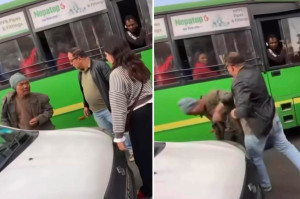Kathmandu
Mayor under fire for City police’s mistreatment of street vendor
Urban planners say instead of chasing and thrashing people in the informal sector, KMC can bring them under the tax net and allow them to operate at a designated place.
Anup Ojha
After a video showing municipal police of the Kathmandu Metropolitan City (KMC) manhandling a vendor went viral on social media and attracted widespread criticism from the public for the ‘unacceptable’ and ‘inhuman’ act, the KMC-run online news portal Metro News on Tuesday published a news report that said the KMC is suspending five City police for misbehaviour.
The news item said that KMC has taken action against a dozen City police personnel for misbehaving with the street vendors. “Seven temporary police were removed from the job and five permanent city police have been suspended,” read the report.
However, Raju Nath Pandey, the City police chief, told the Post that he was not aware of the recent incident and asked the Post reporter to send him the viral video.
“We have suspended five city police and removed seven temporary city police but I am not aware about the recent incident,” Pandey said.
After a 1.6-minute video was uploaded by Kiran Joshi with Twitter handle @kiranjoshi235 on July 9, it received widespread criticism from the public.
“In Balendra Shah’s City, there is no humanity,” read Joshi’s Tweet that was attached with the video, which has over 240,000 views as of Tuesday evening. “Shah should not have gone to this extent.”
In the video, the City police personnel are seen thrashing a vendor, with a bucket full of mango and banana falling down on the road from his bicycle. The vendor is seen wailing.
On July 10, former prime minister Baburam Bhattarai also took to Twitter to condemn the KMC’s act, dubbing it an ‘unacceptable state crime’. “Without making proper alternative arrangements of livelihood for urban poor and labourers in informal sectors, they are being mistreated in public space. With urbanisation, it’s obvious to have all these problems in a country which has a transitional economy,” read Bhattarai’s tweet.
He added: “Nepal and the capital city, Kathmandu, belong to both poor and the rich Nepalis. Instead of using force, the federal, provincial and local governments should work hand in hand to solve this issue, permanently.”
But a few others have supported the City’s actions, saying that the vendors should not go to the inner alleys to sell fruits and vegetables as they create traffic congestion and hassles for pedestrians.
The video, however, is not the first of its kind. Videos of the City police mishandling vendors is an all-pervasive phenomenon ever since Shah became the mayor of Kathmandu Metropolitan City in May last year and he seems to be intolerant toward the urban poor. Over the past one year, thousands of street vendors in Kathmandu have been threatened and manhandled by the City police.
Although the public can walk on the footpaths without hassles after the KMC removed street vendors, the KMC is not able to allot them proper space. While Balendra Shah’s administration has been receiving all-round praise, particularly on social media, for his decision to bring reforms in the education sector, he is criticised for lacking sympathy for the poor.
Scenes of the municipal police seizing goods from street vendors, thrashing and chasing them away have become quite common in the capital. Pavement dwellers, including vegetable sellers, clothes sellers and fruitsellers said living in the city has become increasingly unsafe for them.
However, just before fighting the local election as an independent, Shah had vowed to manage the street vendors. In one of his interviews on AP1 television, Shah had said that the task of the City police is to manage but not to throw away vendors’ goods or mishandle them.
“Mayor Shah is a totally different person before and after the election,” said Raj Kumar Shrestha, deputy general secretary of the Nepal Street Vendor Trade Union.
According to the Union, there are more than 15,000 people in the Kathmandu district depending on such small-scale businesses to provide for their families, but many have left their business after KMC took stringent measures to uproot them.
In an interview before the elections, mayor Shah had said street vending was not a big problem in Kathmandu and that the Mayor's task was to manage space for street vendors.
“It can be solved by letting them run their business from 5:30am to 7:30 am and during the same time in the evening,” Shah had said in a TV interview.
However, Shah’s actions run contrary to his earlier utterances.
“Kathmandu has its own identity and aesthetic value, but it’s now a heterogeneous city. It’s the duty of the local body to let everyone live with respect and dignity,” said Suman Meher Shrestha, an urban planner.
He suggested that instead of chasing and thrashing people in the informal sector, mayor Shah should try to bring them under the tax net. “There are thousands of people in the lower economic strata who can’t afford to go to malls for shopping, and they all depend upon vendors,” Shrestha said. “So if the City can organise them by giving them licence with minimal cost, it will allow them to do their business and the KMC can also collect revenue.”
He said the role of the City police should be to manage the vendors and facilitate them with sanitation and other facilities.
“But thrashing vendors and inhuman behaviour does not suit KMC, although mayor Shah may have good intentions,” Shrestha added.
The first criticism KMC had faced was in July last year, when the KMC police had seized a corn cart from a couple at Baluwatar. Since then, numerous such incidents have unfolded on Kathmandu’s streets.
Meanwhile, criticising the recent incident, the group “Enough is Enough” has decided to protest in front of the KMC gate in Sundhara on Wednesday. The group says it will pass a message for mayor Shah: ‘Garibako chameli, boldiney ko chha ra? (Is there someone to speak for the poor?)’ The line is a snide remark towards the mayor, given he had sung a song with these lyrics before his election.
The group has written on Twitter that they are protesting demanding “accountability, end of municipal brutality, unlawful conduct, responsible arrangements, and a human treatment toward street vendors and cycle and cart vendors.”




 17.9°C Kathmandu
17.9°C Kathmandu.jpg)











